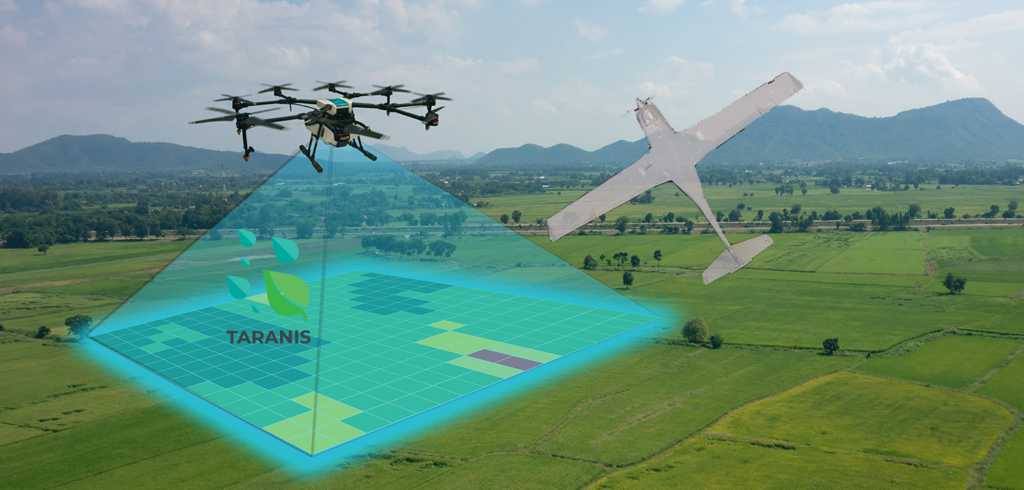Tel Aviv-based Taranis-Visual Ltd has succeeded in raising US$30 million in a series C round led by Vertex Growth, Asian conglomerate The Kuok Group (through its VC division K3 Ventures), and Japanese multinational Hitachi Group. The investors believe the Israeli agtech firm has a bright future ahead following its development of a system for analysing aerial imagery of crops to detect early signs of disease, insect infestation, nutrient deficiency, water damage, and other risk factors.
Additional participants in the latest round, which takes Taranis’ total funding to date up to US$60 million, include Mitsubishi UFJ Capital, iAngels, Gal Yarden, the president of the EMEA division at drip-irrigation company Netafim Ltd, and existing investors Vertex Ventures Israel, Viola Group, Finistere Ventures LLC, and equity crowdfunding company OurCrowd Ltd.
Taranis’ platform combines three visual layers, and its deep learning then uses advanced mathematical models and computer vision to analyse images against the company’s database of over one million crop health issues to generate potential yield warnings and perform tassel counts that accurately estimate yield to streamline operations for harvesting.
Founded in 2015, it uses light aircraft, drones and low-flying aerial vehicles to first capture ultra-high-resolution imagery mid flight. The company’s AI system then analyses these images and aggregates data from satellite images, sensors, and smart irrigation systems, to warn of possible disease, damage, infestation or other concerns. What’s more, it can do so extremely quickly – the company says its system can cover an area of 400,000m² in just six minutes.
How does it work?
According to its website, Taranis combines a two-step approach to deliver the ultimate agricultural imaging solution. The first step, dubbed ‘UHR’, uses 8-12cm resolution ‘whole field’ imagery, captured via cameras installed on a third-party fleet of Cessna aircraft, to identify field zones in need of attention ‘at the plant level’. For large-scale operations, Taranis says it can call upon a network of over 60 light aircraft able to cover 50,000 acres per day.
The aircraft take overlapping images of the entire field before Taranis’ image processing algorithms stitch them together to produce a unified field image for creating zones, prescriptions, sampling and scouting events, and more.
The second step uses the company’s proprietary AI2 drone-mounted technology – the first aerial scouting platform equivalent to field scouting. Based on priorities from UHR, the AI2 is deployed to classify and analyse exactly what’s wrong in each acre by taking pictures of the crop at 0.1mm per pixel – images so sharp, the company claims it can count individual beetles on each leaf!
Each picture is then analysed by its deep learning engine that acts as an automated agronomist to assess plant health and quality. Taranis’ deep learning engine uses bleeding edge math models and hardware platforms on the cloud and has been trained by over 60 expert agronomists providing more than 1,000,000 examples of crop health issues, according to the company.
“The agtech market will soon see consolidation around imagery with just a few strong players remaining,” said Hock Chuan Tam, managing director of Vertex Growth, regarding its decision to invest. “We firmly believe that Taranis will be leading the pack. With Taranis’ support, growers, retailers, cooperatives, and crop consultants can detect, analyse, and treat crop issues at their earliest signs, taking preventive measures with unprecedented precision and gaining a higher degree of control over their crop yield than ever before.”
Sweet deal
The latest funding round follows Taranis’ announcement earlier this month that it had secured an agreement with UPL Ltd, a US$5 billion multinational agrochemical company based in Mumbai with a presence in 130 countries, for exclusive monitoring of UPL’s Brazilian sugarcane sites using its AI2 imaging platform. The collaboration will later expand to include monitoring of UPL’s pasture crops, such as soy, corn, and cotton.
“Taranis’s agriculture intelligence technology enhances the speed and quality at which large crop fields are assessed and treated,” said Ofir Schlam, CEO and co-founder of Taranis, at the time of its partnership with UPL Ltd, one of the five largest agricultural solutions companies worldwide. “We are proud to empower UPL, one of the most influential players in Brazil’s sugarcane industry, with this technology and to strengthen our Latin American operations.”
Award winner
Schlam, a fourth-generation farmer, software developer, and computer science expert, was also recently named as one of five recipients of a PrecisionAg Award of Excellence for 2020. The award recognised how, under his leadership, Taranis has grown from a small start-up into a 100-employee company with 17 offices globally, 19,000 customers, and 20 million acres of land under management. It also praised his foresight in making deals with three key organisations: Stratus Imaging, which brings specialized imagery services to Australian farmers; Climate Corp, to provide field photos for crop health analysis; and John Deere, through participation in its Startup Collaborator.



